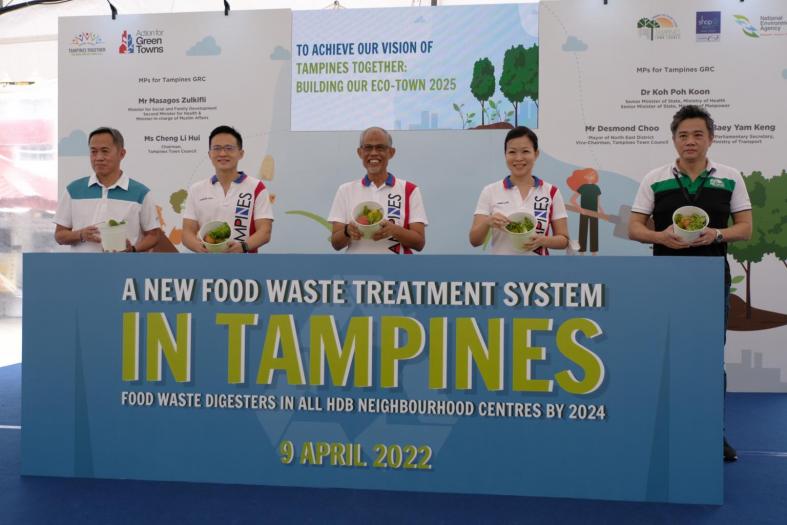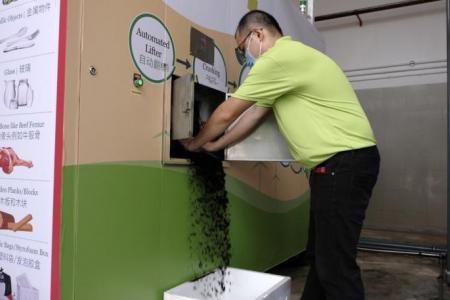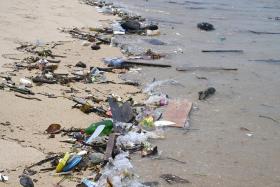Food waste digesters to be expanded across Tampines by 2024
Coffee shops and markets in Tampines are set to get a greener way to get rid of their food waste.
A pilot programme to convert the waste into compost and water will be expanded to neighbourhood centres across the whole town by 2024, said Tampines Town Council in a statement on Saturday (April 9).
A food waste digester installed at a neighbourhood centre in Tampines West is being used by six businesses since last year to get rid of up to 400kg of waste a day.
At an event to announce the expansion of the programme on Saturday, MP for Tampines GRC Masagos Zulkifli said processing food waste at its source can help cut down on the carbon footprint from transporting waste to larger processing plants and the ensuing costs.
He added: "Because the food digester reduces the bulk (of the food waste),we have reduced the number of truck trips for the waste at Our Tampines Hub from four a day to one.
"This reduces the costs borne by consumers, and if we can do this at scale, we can reduce the amount of waste we truck from point to point."
The programme will be expanded to three other HDB neighbourhood centres - N2 in Tampines East, N4 in Tampines North and another in Tampines Changkat.
For the pilot, the waste digester was installed at a bin centre at Block 823A in January last yearafter a six-month trial in 2019 where food waste was transported from the area to a centralised facility at Our Tampines Hub for treatment, said Tampines Town Council.
So far, six merchants, including the wet market and three supermarkets, at the neighbourhood centre have been using the digester, which costs about $100,000 and can process up to 400kg of food waste daily using microbes to break it down into fertiliser and water.
The water, which is not of drinking quality, is flushed down the drains while the fertiliser is distributed to residents and used by the town council for landscaping.
About 10 to 15 per cent of the waste eventually becomes fertiliser.
The town council said six coffee shops in the area and other food retailers will soon start using the digester, which has already processed about 44,100 kg of food waste in the 15 months since it was built.

Tampines West Merchant's Association chairman Ang King Keong, 60, said while merchants initially found it inconvenient to separate food waste from other kinds of waste, the town council has been helping to make using the processor easier.
Mr Ang, a retired coffee-shop operator whose organisation represents about 100 merchants in the Tampines West area, said the town council helps merchants transport their waste to the machine.
He added that the digester has reduced bad odours caused by rotting food and the numbers of pests, like rodents and cockroaches, as food waste is no longer left unprocessed in the bin centre as it was in the past.
Processing food waste in localised set-ups could be a way forward for dealing with the issue, said A-Smart Life engineer Lim Yuxin.
A-Smart Life is the waste solutions company that built the food waste digester. He told The Straits Times that localised food waste digesters can be built to serve HDB blocks, provided that residents are disciplined about separating the waste properly.
Food waste accounts for about 11 per cent of Singapore's total waste, making up about 665,000 tonnes in 2020, according to statistics from the National Environment Agency. About 126,000 tonnes of this was recycled.
Get The New Paper on your phone with the free TNP app. Download from the Apple App Store or Google Play Store now


